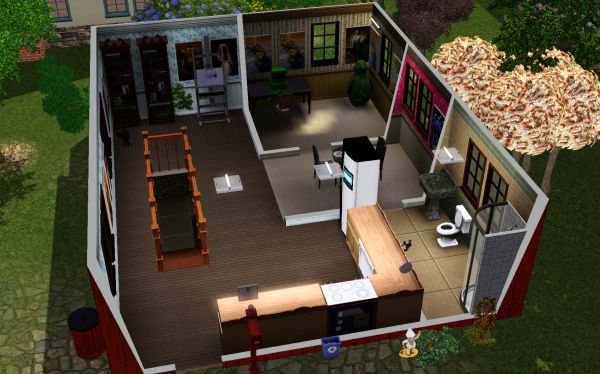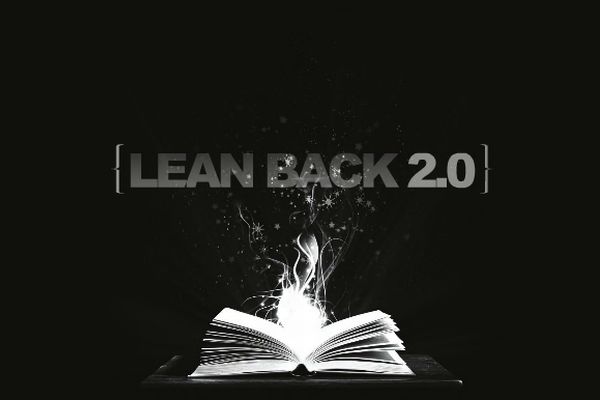
With bedrooms and a second bathroom in the basement, this house in Sims 3 has room for a small family to live very comfortably. Having huge expanses of floor is not something most people will get used to in the near future, if things continue their current course. The bookshelves may also disappear, and the computer be replaced with tablets. Not sure about the mailbox.
For decades now, we who live in the rich world have assumed that we would become richer or richer. OK, perhaps not all of us, but nearly so. Americans have been more accepting of the fact that a society that creates winners must also create losers; here in Europe, we have largely pretended that this only applied to substance abusers. The ordinary Joe and Jane would be better and better off for each passing years, and their children even more so, world without end.
There was a vague sense of guilt because most of the world — the so-called “third world” — seemed lost forever in abject poverty. But that’s what happens when they try to rule themselves, and if it was our parents’ fault, it certainly wasn’t ours, and anyway they supplied us with cheap raw materials so it wasn’t all bad.
While we looked the other way, the developing world actually developed. OK, there are still some few nations mired in unspeakable poverty, usually in a state of war or civil war. But most of the human population isn’t living like that anymore. They still have a long way before they are as wealthy as us, but they are catching up rapidly.
Now the Chinese can do almost all that we can do, only cheaper. And people are understandably getting nervous, when their privileges start to come into question. It is not just theory, either: The income of a single working American is not much different from 20 years ago, and sliding downward. For a while the family wealth increased because both man and wife was working for pay; then it increased because you sold the same houses to each other for ever higher prices. Now that illusion too is broken; people hope that the government will be able to do something, perhaps by confiscating the wealth of the super-rich. But even if you took it all, you would only be able to hold the government debt steady for about a year. There just aren’t that many super-rich, and if you try to sell their stuff all at once you won’t get much for it.
The time may be drawing to a close when we could eat T-bone steak each day and the Chinese ate mostly rice. The steak and the rice are going to be more evenly distributed, so it seems. Not just with the Chinese, but India, Brazil, Indonesia and Nigeria are all huge nations who want their part of the world’s resources. At least the Indians don’t eat cattle… well, most of them don’t. But you get the point. Even though the rising tide raises most of the boats, some of the “super-rich” nations of the world will have to move downward toward the average.
It amuses me when Americans whine about the “1%” rich, and don’t realize that in the eyes of about 6 billion people, they are the 1%. OK, more like 5%, but still. The difference between having a private jet and a car may seem huge, but not when you’re saving up for a cheap bicycle.
***
This was just an introduction, really, but probably necessary because most people in the western world have still not understood with their emotion that their Golden Age has ended, and that lean years are ahead.
***
One trend in the near future of Europe and America should be small, cheap homes. Some of these will be in traditional apartments, but also suburban homes will probably be small, on small plots of land, in order to be affordable. I don’t mean we should tear down the large houses that are still around, I just mean that new homes should be smaller. Young people looking for a place to live will generally not be able to pay a lot, because even if they have a long-term job, it is not likely to be very well paid. There will be exceptions, of course, but their houses are already built, the big ones.
With gas prices set to skyrocket once another billion cars roll onto the roads, the suburbs of the near future should not be just rows of houses with roads to take people to the city. Rather, cities and towns and villages all should have a mixture of residential, shopping and work buildings. Since most work won’t involve smokestacks and the like, there is no reason to have the buildings far apart from the homes. You will not want to drive for an hour for a slightly better paid job, because it will cost you more in gas than you earn. But of course many jobs only exists where there are many people (a neurosurgeon needs a much larger population than a hairdresser). So large cities will continue to be large, but may become more dense and more varied as people seek to live within reasonable distance if they can afford it. Again, small affordable housing near the city or large towns will be highly sought after.
Electric cars will be widespread, but they will remain more expensive than gas or diesel cars, and electricity itself will grow more expensive. At the same time, wages and salaries will continue to shrink. Driving will no longer be something you do thoughtlessly or just because you are bored. And you will think twice about visiting a mall far away, or drive your kids to another town for some trivial activity.
Taking a plane to an overseas vacation will once again be for the rich. In so far as ordinary workers will have vacations, they will mostly spend them at home or at least in their own state, most years. Tourism will continue to grow for a while, because there will be many more tourists from the countries that used to be poor. But it will not grow at a breakneck speed, and not forever. Specifically, travel by plane will necessarily suffer from peak oil and the transportation boom. Planes are fast but not particularly energy-efficient. People will gradually need more and more of a real reason to take them.
With all things electronic continuing to give more value for money, I expect people to gradually switch from skin meetings to video meetings, and relaxing in virtual worlds instead of actual travel. Physical books will also probably become more of a luxury, although this is still a ways off.
The world population is now forecast to peak at somewhere around 9.5 billion, which is within the planet’s capacity to feed, at least for a while. What has changed the most is that most of these people won’t live in dirt poor third world countries, although I fear some will. But most will live in the new “second world”, not the communist world that use to bear that name but rather a compromise between todays first and third world. There are already a good number of such countries, and I expect the rich world to gradually sink to meet them, although not at the same speed as the emerging countries rise.
With a large “world middle class”, food will be expensive but most will be able to afford it. (Again, I expect hard times for the few countries who don’t get up in time.) Luxury food will become luxury again for the ordinary worker in America and Europe. In particular meat will be expensive, since it requires a lot of plant food that could otherwise have been sold to humans. Of course there are many areas that are better suited for grass than for grain, fruit and vegetables. In Scandinavia, for instance, the mountains are suited only for goats and sheep, not for grain or soybeans. I assume the same will hold true for the Rockies and other mountain chains. But overall, meat will become a bit of a luxury. Not something you only taste for Christmas, but perhaps once or twice a week unless you are well off and want to show it.
Again, we are not talking about abject poverty here. I put the word in quotes in the headline because in the eyes of most of the world, it is far from poverty. It is simply sensible living. But for many of us, that will be a rather new thing. We should think ahead and prepare, both individually, as families, and as society.










